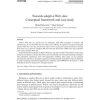Free Online Productivity Tools
i2Speak
i2Symbol
i2OCR
iTex2Img
iWeb2Print
iWeb2Shot
i2Type
iPdf2Split
iPdf2Merge
i2Bopomofo
i2Arabic
i2Style
i2Image
i2PDF
iLatex2Rtf
Sci2ools
121
click to vote
CACM
2000
2000
Adaptive Web sites
Today's Web sites are intricate but not intelligent; while Web navigation is dynamic and idiosyncratic, all too often Web sites are fossils cast in HTML. In response, this paper investigates adaptive Web sites: sites that automatically improve their organization and presentation by learning from visitor access patterns. Adaptive Web sites mine the data buried in Web server logs to produce more easily navigable Web sites. To demonstrate the feasibility of adaptive Web sites, the paper considers the problem of index page synthesis and sketches a solution that relies on novel clustering and conceptual clustering techniques. Our preliminary experiments show that high-quality candidate index pages can be generated automatically, and that our techniques outperform existing methods (including the Apriori algorithm, K-means clustering, hierarchical agglomerative clustering, and COBWEB) in this domain.
Related Content
| Added | 17 Dec 2010 |
| Updated | 17 Dec 2010 |
| Type | Journal |
| Year | 2000 |
| Where | CACM |
| Authors | Mike Perkowitz, Oren Etzioni |
Comments (0)

